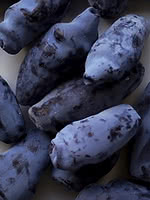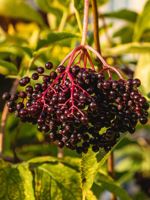Mon-Fri 9am - 5pm Mountain time
Aurora Haskap (Honeyberry) vs Bob Gordon Elderberry
Lonicera caerulea Aurora
Sambucus canadensis Bob Gordon
Aurora Haskap is considered one of the top Haskap varieties, known for its excellent flavour and lower acidity, resulting in a sweeter taste. The flavour of Haskaps is generally described as a cross between a blueberry and a raspberry. Aurora Haskaps are well suited to fresh eating, freezing, baking, and preserves.
It produces high yields of large berries and the upright growth habit makes it suitable for mechanical harvesting. The berries are easily seen on the bush, making them easy to pick.
For optimal fruit production, cross-pollination is required. Haskaps need to be planted with a compatible variety. Compatibility is influenced by both bloom time and genetics.
Aurora Haskap is an early-pollinating variety and pairs well with Borealis, Tundra, Honey Bee, and Indigo Gem.
Bob Gordon Elderberry is a Black Elderberry cultivar that produces berries that are larger and sweeter than other varieties, making it one of the top cultivars. It produces large clusters of white flowers that turn into large clusters of dark purple to black berries. The berries are well-suited for baked goods, jams, jellies, and syrups. It was selected from the wild in Missouri.
The large berry clusters that the Bob Gordon Elderberry produces will often end up hanging downward. This makes it more difficult for birds to feed on the berries. If birds are a concern, this might be the right berry for you.
Black Elderberries are considered to be partially self-pollinating. So while they will still produce some berries without cross-pollination, planting with another variety will increase yields. Consider planting with Black Elderberry or Ranch Elderberry.
Warning: the seeds, stems, leaves, roots, and uncooked berries are toxic to humans when eaten in quantity. Berries should be cooked to make them safe for human consumption.
Aurora Haskap (Honeyberry) Quick Facts
Bob Gordon Elderberry Quick Facts
Toxicity: leaves, stems, and uncooked berries are poisonous to humans

